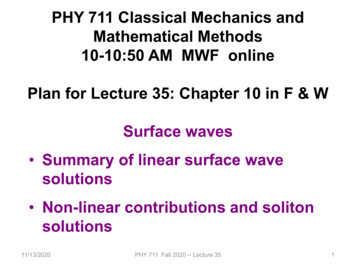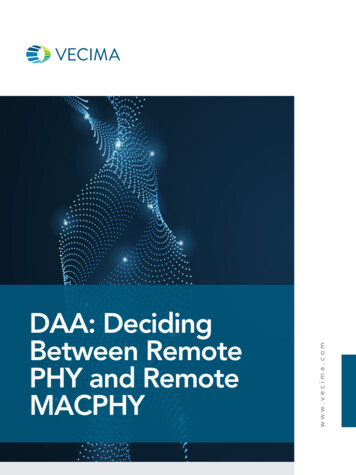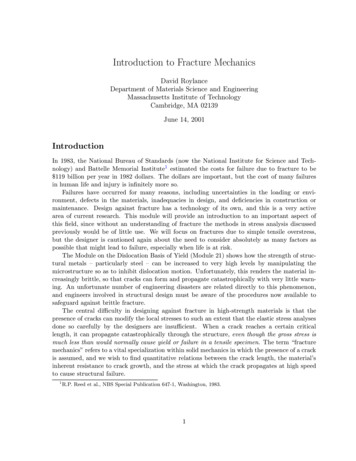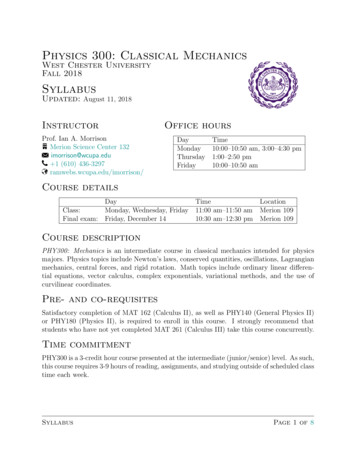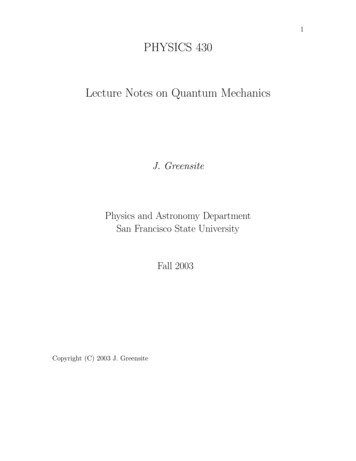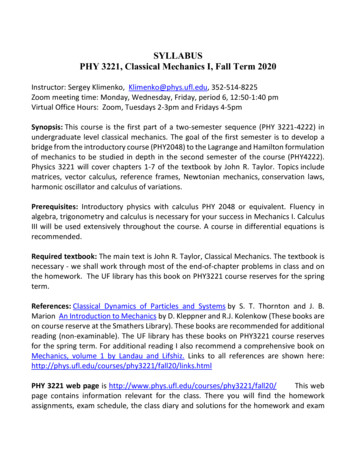
Transcription
SYLLABUSPHY 3221, Classical Mechanics I, Fall Term 2020Instructor: Sergey Klimenko, Klimenko@phys.ufl.edu, 352-514-8225Zoom meeting time: Monday, Wednesday, Friday, period 6, 12:50-1:40 pmVirtual Office Hours: Zoom, Tuesdays 2-3pm and Fridays 4-5pmSynopsis: This course is the first part of a two-semester sequence (PHY 3221-4222) inundergraduate level classical mechanics. The goal of the first semester is to develop abridge from the introductory course (PHY2048) to the Lagrange and Hamilton formulationof mechanics to be studied in depth in the second semester of the course (PHY4222).Physics 3221 will cover chapters 1-7 of the textbook by John R. Taylor. Topics includematrices, vector calculus, reference frames, Newtonian mechanics, conservation laws,harmonic oscillator and calculus of variations.Prerequisites: Introductory physics with calculus PHY 2048 or equivalent. Fluency inalgebra, trigonometry and calculus is necessary for your success in Mechanics I. CalculusIII will be used extensively throughout the course. A course in differential equations isrecommended.Required textbook: The main text is John R. Taylor, Classical Mechanics. The textbook isnecessary - we shall work through most of the end-of-chapter problems in class and onthe homework. The UF library has this book on PHY3221 course reserves for the springterm.References: Classical Dynamics of Particles and Systems by S. T. Thornton and J. B.Marion An Introduction to Mechanics by D. Kleppner and R.J. Kolenkow (These books areon course reserve at the Smathers Library). These books are recommended for additionalreading (non-examinable). The UF library has these books on PHY3221 course reservesfor the spring term. For additional reading I also recommend a comprehensive book onMechanics, volume 1 by Landau and Lifshiz. Links to all references are shown nks.htmlPHY 3221 web page is s webpage contains information relevant for the class. There you will find the homeworkassignments, exam schedule, the class diary and solutions for the homework and exam
problems. Please, check for updates regularly, especially if you miss a lecture.Homework: There will be 9 graded homework (HW) assignments during the semester.Homework assignments and due dates, subject to change, are available viathe Homework link on the left panel of the course web page. Homework will be collectedin canvas before the due date. Students will need to upload their homework as a singlefile in pdf format to the corresponding HW assignment. HWs will not be accepted outsideof the canvas and overdue HWs will not be graded. Make your solutions neat, concise,and intelligible. It is not sufficient just to state the answer. Points may be deducted, if it isdifficult to find and/or understand the solutions. There will be no make up homework.Instead the lowest homework score will be dropped at the end of the semester. Thegraded HWs will be worth 30% of the total grade (see grading policy below).Online exams: There will be three online exams scheduled on September 30, November3 and December 8. There is no final exam for this course. Students will need to uploadtheir exam solutions in a single file in pdf format to the corresponding exam assignmentin Canvas. Make your solutions neat, concise, and intelligible. It is not sufficient just tostate the answer. Points may be deducted, if it is difficult to find and/or understand thesolutions. Exams will not be accepted outside of the canvas and overdue exams will notbe graded. There will be no make up exams. Instead the lowest exam score will bedropped at the end of the semester. The remaining two exams will contribute 30% eachtoward the final grade. All exams are online and proctored by Honorlock. All three examswill be ”closed book” and NO cell-phones or other hi-tech gadgets are allowed.Calculators are permitted. Relevant Principal Definitions and Equations from the textbookwill be provided. During the exam students can also use a single paper sheet of A4 formatwith any hand-written material they prepare before the exam.Online quizzes: There will be 9-10 quizzes throughout the semester. The quizzes will notbe announced in advance. No quiz shall be given during the week of one of the exams,during the first week of classes or during the homework due date. Each quiz will last nomore than 10 min and will be administered at the beginning or end of the lecture. Allquizzes are online. All quizzes will be ”closed book” and NO cell-phones or other hi-techgadgets are allowed. Students will need to upload their quiz solutions in a single file in pdfformat to the corresponding quiz assignment in Canvas. Quizzes will not be acceptedoutside of the canvas and overdue quizzes will not be graded. There will be no make-upquizzes, but one lowest quiz score will be dropped and there will be 3 bonus quizzes. Thelowest score is 0 for missed quizzes and 1-4 for taken quizzes. The quizzes will contributea total of 10% towards the final grade.
Zoom polls: zoom polls will be used during zoom meetings for better interaction in classand receive feedback from students: setting up important due dates, feedback on coursematerial, feedback on problems discussed in class, etc. None of zoom polls will be gradedGrading procedure: All assignments will be graded within a few days after the due date,exams are graded the next day. The graded assignments will be uploaded to Canvas (alongwith solutions) and grading scores entered to Canvas for student’s review. All questionsregarding graded work should be sent to klimenk0@phys.ufl.edu or asked in personduring the office hours.Grading policy: Each graded assignment (quiz, homework or exam) has a maximum score(Sm) - the total sum of scores of all examinable problems in the assignment. In additionto the examinable problems, assignments may have bonus questions, which do notcontribute to the maximum score, but are accounted for in the total score (S) gained by astudent. Because of the bonus questions it is possible that S could be greater than Sm.The ratios S/Sm from all assignments are used to calculate the final percentage scoreaccording to the following grading formula. The percentage score will be determined byyour homework assignments (30%), exams (60%) and quizzes (10%). Because the bonusquestions it is possible that S Sm. Your final grades will be based on the total sum ofpercentage scores for quizzes, homework and exams, and defined by the followinggrading table:gradeAA-B BB-C CC-D DD-Escore90%85%80%75%70%65%60%50%40%35%35%30%The corresponding grades are assigned at or above the score threshold shown in thetable. These thresholds may be lowered, depending upon numerous factors, but will notbe raised. C is the lowest passing grade for physics majors!The grader for the course is name Goyal, Adamya, e-mail adamyapgoyal@ufl.edu ,room 2153, Office hours: Friday 2-3pmFor additional details regarding grading policies, please, see the university lations/info/grades.aspx
Support for technologies used in class: To follow classes and participate in the classactivities students need a computer, tablet or phone with installed Zoom application.Headphones are recommended particularly if you are in the noisy location. Students willneed a video player application to watch our class sessions that may be audio-visuallyrecorded for students in the class to refer back and for enrolled students who are unableto attend live. Students who participate with their camera engaged or utilize a profileimage are agreeing to have their video or image recorded. If you are unwilling to consentto have your profile or video image recorded, be sure to keep your camera off and do notuse a profile image. Likewise, students who un-mute during class and participate orallyare agreeing to have their voice recorded. If you are not willing to consent to have yourvoice recorded during class, you will need to keep your mute button activated andcommunicate exclusively using the "chat" feature, which allows students to typequestions and comments live. The chat will not be recorded or shared. As in all courses,unauthorized recording and unauthorized sharing of recorded materials by students orany other party is prohibited. All assignments work should be converted to pdf formatwith a suitable application of your choice or scanner. To do homework and quizzes, it isrecommended to use one of the note taking applications, like GoodNotes 5, which havean export-to-pdf function. Please, follow the UF netiquette guide for online courses: link.For access to UF network follow instructions for how to set up the network VPNConnections. Contact UF computing desk for help with Canvas, Zoom and Honorlock:Available 24 hours a day, 7 days a weekPhone: (352) 392-HELP (4357)Email: helpdesk@ufl.eduWeb: https://helpdesk.ufl.edu/Requirements for class attendance and make-up exams, assignments and other work inthis course are consistent with the university policies that can be found ns/info/attendance.aspxStudents with disabilities requesting accommodations should first register with theDisability Resource Center (352-392-8565, www.dso.ufl.edu/drc) by providingappropriate documentation. Once registered, students will receive an accommodationletter which must be presented to the instructor when requesting accommodation.Students with disabilities should follow this procedure as early as possible in thesemester.
Students are expected to provide professional and respectful feedback on the quality ofinstruction in this course by completing course evaluations online via GatorEvals.Guidance on how to give feedback in a professional and respectful manner is availableat https://gatorevals.aa.ufl.edu/students/. Students will be notified when the evaluationperiod opens, and can complete evaluations through the email they receive als,orvia https://ufl.bluera.com/ufl/. Summaries of course evaluation results are available tostudents at https://gatorevals.aa.ufl.edu/public-results/UF students are bound by The Honor Pledge which states “We, the members of theUniversity of Florida community, pledge to hold ourselves and our peers to the higheststandards of honor and integrity by abiding by the Honor Code. The Honor Code can befound here: ct-honor-code/Office of Academic Support: offers free one-on-one and small group tutoring sessionsto all UF students interested. The tutors are proficient in a broad range of topics,including economics, mathematics, statistics, writing, accounting, Spanish and thephysical and biological sciences. OAS tutors go through a rigorous selection process andreceive training so that they are prepared to answer questions. Remember thesetutoring services are offered at no additional cost to all UF students. Contactinformation: https://oas.aa.ufl.edu/services/Student Life Success Services: Enhancing student success through learning andengagement - check out this web ices/and contact their academic ote-advising-contacts/Counseling and Wellness Center: Contact information for the Counseling and WellnessCenter: http://www.counseling.ufl.edu/cwc/Default.aspx (392-1575), and the UF PoliceDepartment: 392-1111 or 911 for emergencies.
Communication and interaction expectations.Phy3221 is an online synchronous course delivered via Zoom meetings starting on August 31, everyMonday, Wednesday and Friday at 12:40-1:30pm, excluding holidays – check out the course scheduleStudents will need to run zoom on one of suitable devices: computer, tablet or phone with access to theinternet. Students will be able to view all lecture material via shared screen and listen to lectures overaudio channel. All lectures will be recorded and available from zoom cite or Canvas after classes. Lecturenotes will be posted on canvas with links in the course schedule. During lectures students will have theopportunity to ask and answer questions. In addition, twice a week, there will be Zoom Office Hours:Tuesdays 2-3pm and Fridays 4-5pm. All assignments will be posted in Canvas with specified start andend date and time. Quizzes and exams will be proctored by Honorlock. For each assignment studentsshould compile their work in a single pdf file and upload this file to the corresponding Canvas portal. Allgrade scores will be stored in Canvas.Technologies that will be used in the course.Phy3221 synchronous course heavily relies on Canvas and Zoom. Students will need to run a zoom appon one of suitable devices: computer, tablet or phone with access to the internet. Students will be able
to view all lecture material via shared screen and listen to lectures over audio channel. All lectures willbe recorded and available from zoom cite or Canvas after classes. Quizzes and exams will be proctoredby Honorlock. For each assignment students should compile their work in a single pdf file and uploadthis file to the corresponding Canvas portal. For preparation of graded work it is recommended to use atablet and graphic pen together with a suitable note taking application (for example Good Notes 5) whichallows to save notes in pdf format. Also, students may use a usual pen and white paper to do the courseassignments, scan multiple paper sheets into a single pdf file and upload it to Canvas.Provide learners with information on protecting their data and privacy for tools introduced orrecommended throughout the course.Canvas is used to keep track of all personal data, graded work and grades. Scheduled course zoommeetings are protected by password.How to find academic or student services support.how the course materials help students to complete courses activities and achieve the course learningobjectives.how each activity or assignment is related to the course objectives and how submitted work isevaluated.Lectures give detail and interactive explanation of the text-book material, explanation of mainconcepts, their relations to each other, description of real world and step-by-step application ofthese concepts to solve problems. The goal of lectures is not to memorize material but todevelop critical thinking, which is crucial in understanding of main concepts and theirapplications for solving problems.- Lecture notes keep track of the discussion topics and put the text-book material in the contextof specific problems discussed in class- Quizzes provide quick assessment of topics missed by students and common mistakes- Homework is the main tool to master math skills and logical reasoning.- Exams give students an opportunity to test their knowledge and demonstrate that they canthink clearly, rationally and can make logical connections between different ideas to solveproblems. Both exams and homework do not use multiple choice problems.All submitted work is evaluated not just to get a grade, but to help students to understand theirmistakes in use and application of basic concepts and logical reasoning. Usually there is no penalty fortypos and small mistakes and students get almost full credit if they demonstrate understanding of theproblem and provide conceptually correct solutions.-
Its methods and ideas are crucially important, as they form the basis of all other branches of theoreticalphysics, including quantum mechanics, statistical physics, and field theory. Such concepts as theLagrangian and Hamiltonian formalisms, normal oscillations, adiabatic invariants, Liouville theorem, andcanonical transformations lay the foundation, without which any further in-depth study of theoretical physicsis impossible.1. Demonstrate an intermediate knowledge of Newton’s Laws. DLO 1 2. Demonstrate a basicknowledge of equations of motion. DLO 1, 2 3. Apply advanced Newtonian methods to complex motionproblems. DLO 1, 2 4. Demonstrate an intermediate knowledge of oscillatory motion. DLO 1, 2 5.Describe and model the oscillations of damped and undamped systems. DLO 1, 2 6. Demonstrate a basicknowledge of Calculus of Variations. DLO 1 7. Demonstrate a basic knowledge of Lagrangian &Hamiltonian dynamics. DLO 1 8. Apply Lagrangian & Hamiltonian methods to complex motionproblems. DLO 1, 2 9. Demonstrate an intermediate knowledge of central-force motion. DLO 1, 2 10.Apply advanced methods to complex central-force motion problems. DLO 1, 2 11. Generate solutions tomathematical problems using current data analysis software (Mathcad). DLO 2, 4 12. Apply thefundamental processes of investigation, modeling and analysis DLO 2, 3This is an upper level college physics course that emphasizes a systematic approach to the mathematicalformulation of mechanics problems and to the physical interpretation of the solutions. Fundamentalconcepts and principles in classical mechanics will be applied to particles, systems of articles and rigidbodies. The mathematical framework developed in this course will consist of advanced mathematicaland numerical techniques that will provide a solid mathematical background used in all modern physics.
Mechanics 1Sergey Klimenkoklimenko@phys.ufl.educourse web pageWelcome to Mechanics 1 - the first course of the two-semester sequence in undergraduate level classicalmechanics. This is an online synchronous course delivered via Zoom meetings starting on August 31,every Monday, Wednesday and Friday at 12:40-1:30pm. Check out the Course Description below, andparticularly the main course web page -- the collections of useful links you will use during thesemester. The course page also lists the required books and technologies; you'll need these beginningAugust 31st. The course policies are described in syllabus, including description of the courseassignments and grading policy. You could keep track of classes in the course schedule -- it lists allcourse assignments, important due dates and has links to the course notes. While the exam dates and theassignment due dates are unlikely to change, please, note that the course schedule is a living document,which is updated to accommodate for possible schedule changes during the semester. All sensitiveinformation (graded work, grade scores, etc) will be stored in Canvas, which will also be used for onlineexams and quizzes with the Honorlock proctoring. Links to all scheduled zoom meetings will beavailable via Canvas Calendar.Course Description: This course lays out the foundation for students to understand the mathematicalformulation of Newton’s mechanics. Starting with the basic concepts introduced by Galileo and Newton,the course gives a deeper understanding of these concepts and introduces a more advanced formulationof mechanics developed by Lagrange and Hamilton. The Lagrangian and Hamiltonian mechanics givesdeeper insights of conservation laws in physics, mechanics of non-inertial frames, motion of complexsystems and form the basis of other branches of theoretical physics, including quantum mechanics,statistical physics, and field theory. This course requires more advanced mathematical skills and logical
reasoning going beyond introductory physics courses. The mathematical framework developed in thiscourse - vectors, vector calculus, differential equations, Fourier series, calculus of variation and linearalgebra - provide a solid mathematical background used in other branches of scienceCourse Prerequisites: Introductory physics with calculus PHY 2048 or equivalent. Fluency in algebra,trigonometry and calculus is necessary for your success in Mechanics I. Calculus III will be usedextensively throughout the course. Courses in differential equations and linear algebra are recommended.Course Learning Goals: The goal of the course is to develop a bridge from the introductory course(PHY2048) to the Lagrangian and Hamiltonian formulation of mechanics. At the end of the semester,students will be able to demonstrate a knowledge of Newton’s Lawsdemonstrate a knowledge of equations of motionunderstand the conservation laws governing physical systemsapply advanced Newtonian methods to complex motion problems.demonstrate an knowledge of oscillatory motion.demonstrate a basic knowledge of Calculus of Variationsdemonstrate a basic knowledge of Lagrangian & Hamiltonian mechanics.apply Lagrangian & Hamiltonian methods to complex motion problems.develop skills for logical analysis of complex problemsdevelop a solid mathematical background used in other branches of science
undergraduate level classical mechanics. The goal of the first semester is to develop a bridge from the introductory course (PHY2048) to the Lagrange and Hamilton formulation of mechanics to be studied in depth in the second semester of the course (PHY4222). Physics 3221 will cover chapters 1-7 of the textbook by John R. Taylor. Topics include
